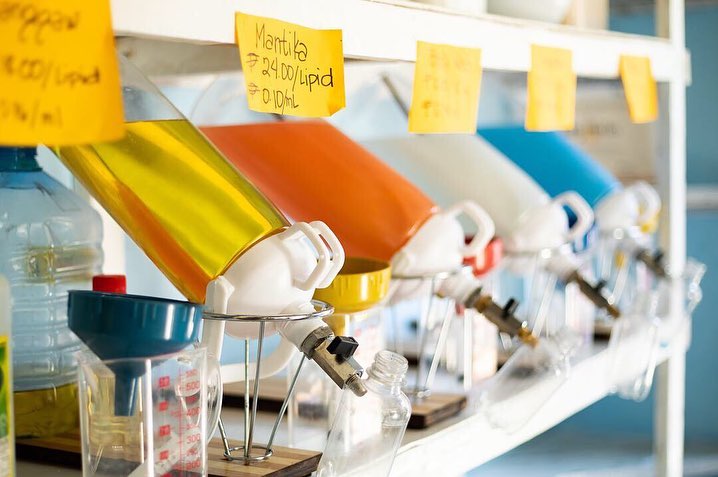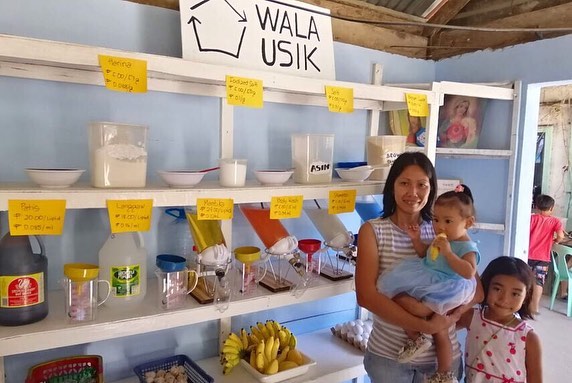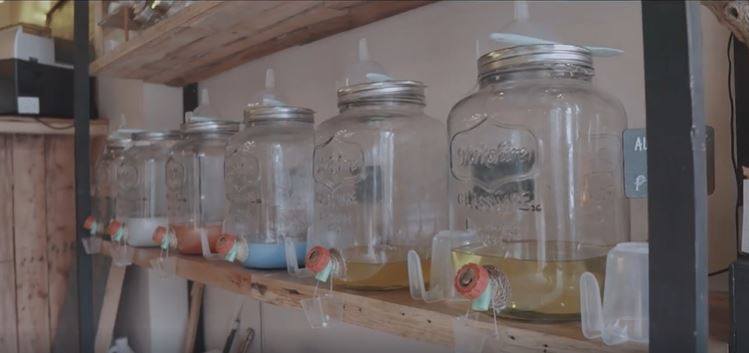Wala-Usik Sari-sari stores innovate with non-sachet products to help reduce sea waste
By: Gicel Livelo
|
Published on: February 22, 2020

Wala Usik or Zero Waste Sari Sari Stores serve as refilling stations instead of selling products packaged in sachets. Photo from SWEEP.
Wala Usik Sari-sari stores are innovating by selling products not using plastic sachets and instead encourage the use of refillable and reusable containers in an effort to help reduce sea waste.
These efforts by the Wala Usik Sari-Sari stores were documented by the Sea Waste Education to Eradicate Plastic (SWEEP) as it conducted a year-long program that focuses on redesigning sachet culture in Filipino communities.
SWEEP is the group that started the Wala Usik : Tiangge + Kapehan in Bacolod City, the very first zero-waste store, cafe, and social enterprise hub in Negros Island.
In the SWEEP video report released on January 19, 2020, during the National Zero-Waste Month, the zero waste advocates told the story of 12 months of experience partnering with store owners to design and launch micro-refilling prototypes through 8 Wala Usik sari-sari stores, conducted monthly innovation labs for and with other social enterprises, worked with corporations to test Wala Usik models of products and services, guided schools and municipalities towards reducing their carbon and plastic footprint, and more.
The movement is predicated on the fact that the Philippines contributes over a million ocean plastics every day. The Wala Usik program – Hiligaynon term for ‘Wala’ meaning nothing and ‘Usik’ meaning ‘waste’ generally means “nothing wasted” or zero waste – seeks to empower zero-waste advocates and prevent the use of single-use plastic that is produced based on the volumes purchased in sari-sari stores.
Dave Albao, the executive director of the Philippine Reef and Rainforest Conservation Foundatioin Inc. which implements the SWEEP Program explained the rationale of their mission. “The thing about plastic waste in the ocean, it doesn’t know any boundaries. It doesn’t have any political borders,” stated Albao.

This Wala Usik store in Bulata, Negros Occidental was the first to be launched in 2019
Wala-Usik Sari-sari stores were implemented in the communities to see if sachets can be replaced with micro refilling at the same price point. There are 8 Wala Usik sari-sari stores to date in Bacolod, Cauayan, Sipalay, Hinoba-an, Sta. Catalina, Basay, Siaton, and Bayawan.
One of the sari-sari store owners, Sweet Montes of Brgy. Bulata, Cauayan said that she used to sweep plastic waste every hour whenever it gets windy as she gets frustrated that her house gets dirty from all the plastic wastes the wind blows.
“As part of the project, we conducted coastal cleanups and waste audits so we could see what types of waste end up in the communities. We looked for existing sari-sari stores and we conducted a design thinking workshop to help them set up.” said Ida Vecino, the Social Enterprise and Economic Development Officer at PRRCFI.
Community Facilitator Carmela Ellaga mentioned that design thinking really helped, “Because the store owners themselves created the design and layout of the stores and which products they want to sell.”
Lilian Gordoncillio, another store owner of Brgy. Banago, Bacolod sells rice, cooking oil, vinegar, soy sauce, soap, detergent, and chlorine powder and puts them in reusable containers. She sells her rice in 1kg increments and refills them in reusable Stick-O containers which she lends to her neighbors and gets them back after being bought and used.
Programme Manager Len Manriquez mentioned that one of their corporate partners is a fast food chain which has a daily footprint of about 2,000 straws in one store. She then states that after learning of the Wala-Usik program and undergoing a workshop, the chain committed to no longer serving straws in their stores.

Wala Usik Sari-Sari Stores use jars for dish washing liquid products instead of sachets. Screenshot from SWEEP Facebook.
The group was also invited by a national telecommunications company to bring the Wala-Usik model to the Masskara Festival, month-long festival in the Philippines.
“After 7 months of wala-usik operations we have prevented over 45,000 pieces of plastic from entering oceans,” notes Albao.
They talked about working with one of the largest transnational corporations to test a prototype of an instant coffee powdered beverage in a dispensing machine. It was said to be the first time it will be available in a sari-sari store, particularly one of their partner Wala-Usik store.
“We’re working with one of the largest transnational corporations in the world to test a prototype of their instant coffee powdered beverage dispensing machine. This is the fist time it will be available in a sari-sari store. And one of our partner Wala-Usik store,” said PRRCFI.
The SWEEP chief also talked about the many ways to address the challenges of refilling in the communities, mentioning a petition in the Philippines to make refilling mainstream. He believes that the government, corporations, private sectors, and communities can truly design a refilling model that will be safe, sustainable, accessible, and affordable for the communities.
“To build a truly circular economy, a new economy of the future, we need not just government. We need big businesses and small businesses. We need communities, schools, NGOs, even micro financing institutions to be a part of this behavior change from different levels.” said Albao.
Wala Usik : Tiangge + Kapehan was recognized by the Department of Environment and Natural Resources for advocating zero-waste.
A school, also in Negros, was noticed for their Wala-Usik canteen that uses bamboo mugs and coconut bowls as alternative to the usual dining ware.
WATCH the video here and SEND CHEERS in the comments below to the SWEEP group and advocates of zero waste for the Wala Usik Sari Sari store innovation that helps reduce plastic pollution in the oceans!
Want to know how to be a Proud Pinoy? Like, Follow, Subscribe to GoodNewsPilipinas.com and our socials Facebook, Twitter, Instagram, Good News Pilipinas! TV on YouTube, for new story notifications and e-mail newsletters for updates on more Filipino Pride stories.